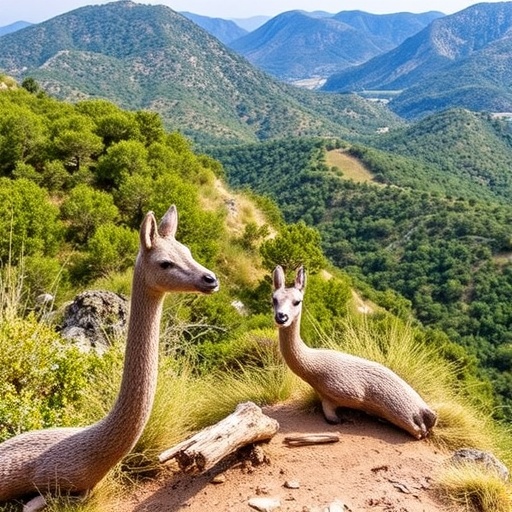In recent years, the practice of rewilding has gained traction as a viable strategy for restoring ecosystems and enhancing biodiversity in various landscapes. A significant study explores this concept, particularly within the unique context of Mediterranean cultural landscapes. Mediterranean regions are characterized by their rich biodiversity, but they are also heavily influenced by human activities, making the conservation of these areas critical. The focus of this research is to determine whether rewilding can serve as an effective tool for biodiversity conservation, especially in areas where human presence has profoundly shaped the ecological landscape.
Rewilding aims to reinstate natural processes and evolutionary trajectories within ecosystems, promoting a return to a state where native species can thrive in their natural habitats. This approach often involves the reintroduction of key species, also known as “keystone species,” which play an essential role in maintaining the structure of their ecological community. The study examines how these practices can not only revitalize the flora and fauna of the Mediterranean but also contribute to the cultural and aesthetic values that these landscapes hold for local communities.
A notable aspect of the Mediterranean is its diverse habitats, which range from coastal regions to mountainous terrains, each harboring unique species and ecological relationships. The research delves into how human-induced changes, such as agriculture, urbanization, and land-use alterations, have led to a decline in native biodiversity. In response, rewilding offers a framework for reversing these negative trends by allowing ecosystems to recover and restore their natural balance.
The Mediterranean region is particularly vulnerable to climate change, with rising temperatures and altered precipitation patterns threatening its delicate ecological systems. The study highlights that rewilding could enhance the resilience of these ecosystems, enabling them to adapt to changing climatic conditions. By restoring natural habitats and promoting biodiversity, rewilding can create ecological corridors that facilitate species migration and gene flow, which are essential for long-term survival.
One of the key findings of the research indicates that rewilding efforts in Mediterranean cultural landscapes could lead to significant increases in species richness. This occurs because rewilding initiatives encourage the growth of native plant species, which in turn supports a diverse array of animal species. The return of herbivores, predators, and various other fauna can help restore trophic dynamics, which are critical for maintaining biodiversity.
The study also explores the socio-economic implications of rewilding in Mediterranean landscapes. It suggests that embracing rewilding could support local economies through ecotourism and sustainable land management practices. Communities can benefit from the aesthetic and recreational values these restored landscapes provide, fostering a deeper connection with nature and promoting environmental stewardship.
Critically, the researchers emphasize the importance of stakeholder engagement in successful rewilding initiatives. Collaborative approaches that involve local communities, conservationists, and policymakers are crucial for developing and implementing effective strategies. By participating in the rewilding process, local stakeholders can share knowledge, resources, and a vested interest in the outcomes. This cooperative model can help mitigate potential conflicts that may arise from differing land-use priorities.
As the study evidences, effective rewilding cannot be a one-size-fits-all model; instead, it must be tailored to the specific ecological and cultural contexts of Mediterranean landscapes. This nuanced approach requires comprehensive assessments of the local flora and fauna, as well as an understanding of the historical and cultural significance of the land. Such detailed planning ensures that rewilding efforts are scientifically grounded and socio-culturally relevant.
The researchers also discuss the potential challenges faced during the rewilding process. Issues such as invasive species, habitat fragmentation, and the need for continuous monitoring and management are critical factors that can hinder success. The study advocates for adaptive management strategies that can respond to ongoing ecological changes and emerging challenges. Continuous evaluation will ensure that rewilding initiatives remain effective and that biodiversity gains are sustained over time.
It is crucial to recognize that the success of rewilding efforts is not solely measured by increases in biodiversity, but also by the overall health of the ecosystem. Healthy ecosystems provide essential services such as carbon storage, water filtration, and soil fertility, all of which are vital for the well-being of both human and non-human communities. The study argues that rewilding can enhance these ecosystem services, making a compelling case for its integration into broader conservation strategies.
In summary, the research findings present a promising outlook for the role of rewilding in contributing to biodiversity conservation in Mediterranean cultural landscapes. It represents a transformative approach to land management that embraces nature’s ability to rejuvenate itself when given the chance. By allowing ecosystems to recover from past disturbances, rewilding not only restores biodiversity but also fosters a sustainable relationship between humans and nature.
As the world grapples with unprecedented biodiversity loss and the threats posed by climate change, the study urges policymakers and conservationists to consider rewilding as a serious strategy for ecological restoration. It calls for a shift in perspective—viewing Mediterranean landscapes not merely as areas to be managed for productivity but as dynamic ecosystems that require nurturing and respect. The future of biodiversity in these culturally rich landscapes hangs in the balance, and rewilding may be the key to unlocking their potential for revival and resilience.
Subject of Research: Rewilding and its contribution to biodiversity conservation in Mediterranean cultural landscapes.
Article Title: Does re-wilding contribute to biodiversity conservation in Mediterranean cultural landscapes?
Article References:
Bugalho, M.N., Pérez-Barbería, F.J., Pereira, J.M.C. et al. Does re-wilding contribute to biodiversity conservation in Mediterranean cultural landscapes?
Ambio (2025). https://doi.org/10.1007/s13280-025-02266-x
Image Credits: AI Generated
DOI: 11 October 2025
Keywords: Rewilding, biodiversity, Mediterranean landscapes, ecosystem restoration, cultural landscapes, conservation strategies.




